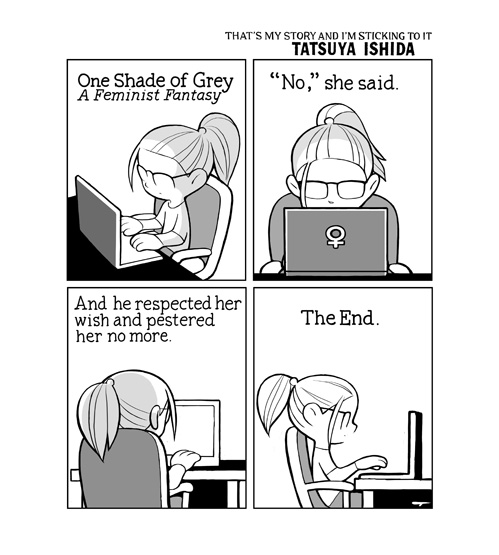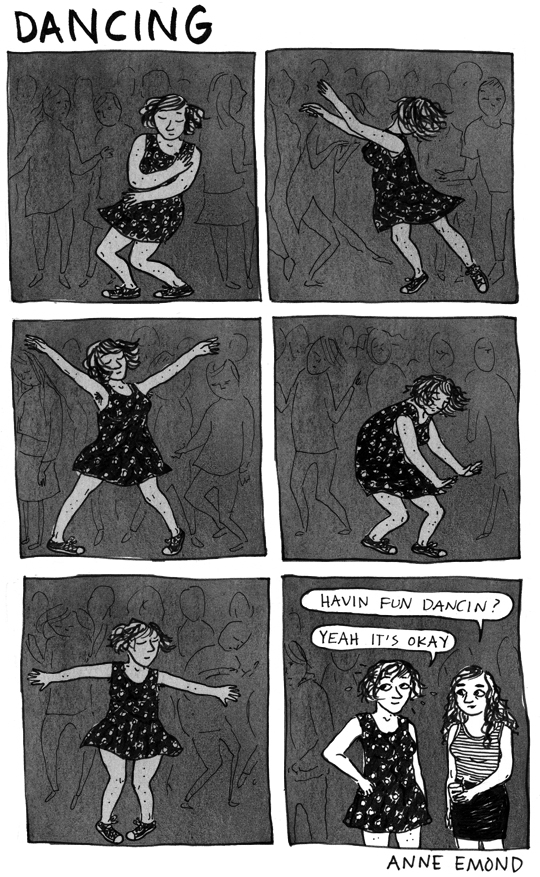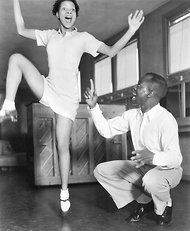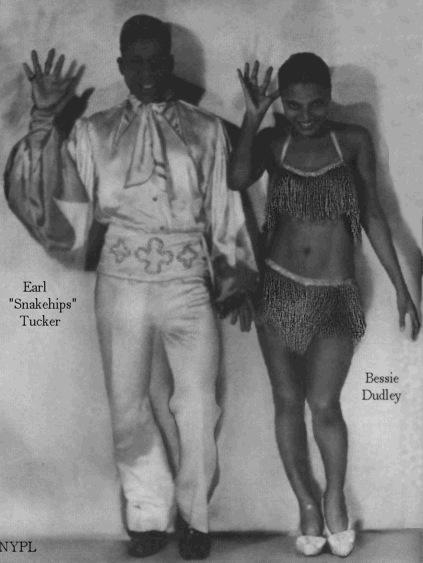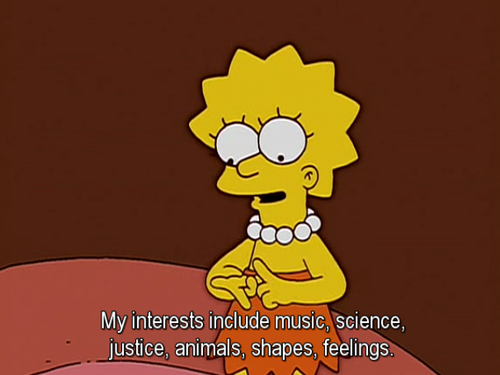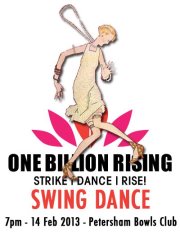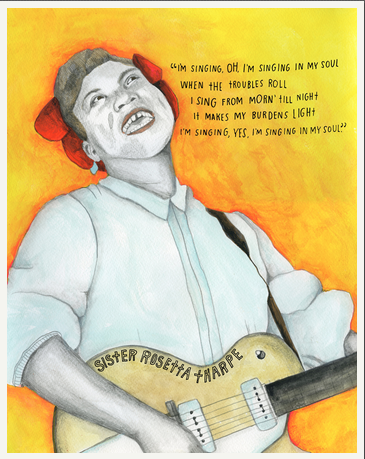(from sinfest, via mindlessmunkey)
Category Archives: wimminz
with your eyes closed, not worrying about what you look like
Things haven’t been so great round here, so I haven’t been able to do any Women’s History Month updates. Here’s a comic by one of my favourite illustrators, Ann Emond, because it reminds me that the best dancing in all the world is the dancing you do with your eyes closed, wearing your favourite clothes and not worrying about what you look like. So, pretty much the opposite of 90% of lindy hop.
Women’s History Month 2013: Jeni LeGon!
Women’s History Month 2013: Sandra Gibson!
(another post I’ve just lifted from 2011 – late night, lots of DJing and dancing, feeling a bit too poop to be creative)
aka Mildred “Boogie” Pollard, aka Lindy hopper!
In Radio City Revels in 1938, Gibson’s in the second couple in the jam, but the first couple after the cut from the singer at the beginning (ie there’s another couple in the jam before Gibson and partner ‘Shorty’ Davis).
In Spirit Moves in 1950 with James Berry:
Women’s History Month: Florence Hill and Bessie Dudley
It’s women’s history month again, and I’m a bit slow off the mark (again).
The theme for the Australian Women’s History Month is ‘Finding Founding Mothers’, which is alright by me.
In 2011 I listed a different woman jazz dancer every day for WHM. And in 2012 I chose a different woman jazz musician. The musician one was hard, and didn’t really catch my interest. Because I’m so slack this year, I’m going to recycle my 2011 posts. And I’m going to look for more women, when I get time. There are just so many amazing women jazz dancers, it’s silly to just rehash the same 30. Especially when we need to remember MORE!
But for now, here are my two favourites. One for yesterday, and one for today, the 2nd March.
Florence Hill AND Bessie Dudley!
Here are some stills:
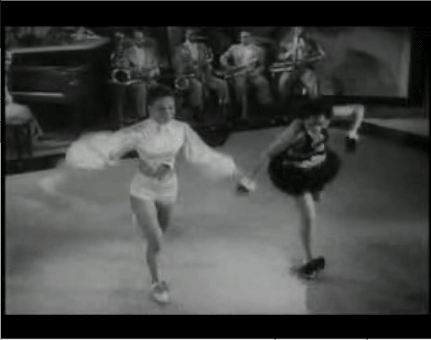
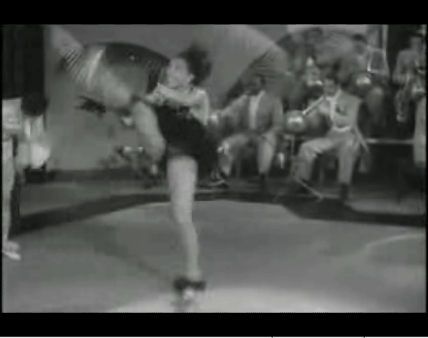
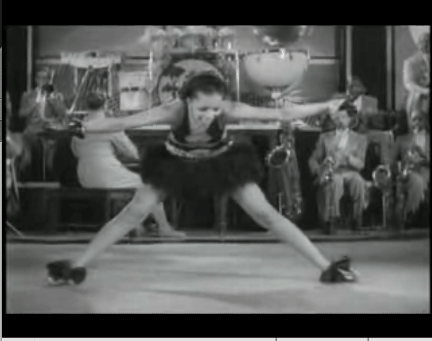
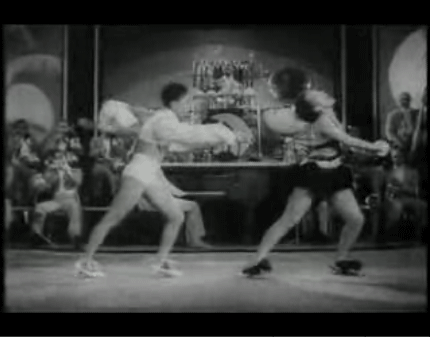
These are all stills from A Bundle of Blues, a short film starring Duke Ellington and his orchestra (including Ivie Anderson), Florence Hill and Bessie Dudley.
(linky)
I can’t confirm this, but apparently Bessie Dudley worked with Snake Hips Tucker, and he gave her a black eye for doing his act.
Here is a photo of Bessie Dudley with Snake Hips Tucker:
I don’t have time to do more research (I say this every single year), but Dudley was a dancer at the Cotton Club, so if you’re curious, you could start there.
I am so done.
Firstly:
I am so trashed. I am so wrecked. My poor, poor body. We raised > $2000 for the Taree Women and Children’s Refuge last night at One Billion (Jazz Dancers) Rising. It was an event run by a gang of women (with some male helpers) – which is really business as usual in the Sydney lindy hop scene – at the Petersham Bowls Club. It had lots of sponsors. It was really, really good. I had a massive amount of fun. I heard some guy say at some point “We should do more fundraisers!” and I agree.
I still have nine million things to do this week.
Secondly:
This week on FB some guy gave me a patronising telling off and then a mansplain about why I shouldn’t just complain about blokes doing dodgy stuff in the dance world, I should speak to them about it. In a thread that I had begun with the comment that I was done with mansplainers ‘helping’ female DJs.

Why thank you, Elder, it hadn’t occurred to me that speaking to people about these things directly, or doing something about these things might be helpful. Where would I be without you to explain where I went wrong with my irrational ladytalk?
Hilary Clinton doesn’t have enough nods to express my feelings.

For fuck’s sake.
I am done. I am so done. imma gonna ride my happy post-successful-event mellow right outta this town.
Thirdly:
I cannot be fucked getting back into that whole thing about …whatever it was. I feel obliged to respond and continue, but, honestly, I cannot be bothered. I do want to write about gendered language and dance at some point, but then, I’ve done that a lot already. It’s kind of first year undergraduate stuff, and I’ve gone over it and over it a million times before, here on this blog and elsewhere. Feminism 101 has a piece on it. And I think Feminism 101 gives me a good reason to not do that ‘mother’ thing for people asking why we need to use non-gender specific language:
The first reason FF101 exists is to help ensure that discussions between feminists don’t get continually derailed by challenges from newbies and/or antagonists to explain and justify our terminology and conclusions to them, right now! Substantive challenges can be valuable, but constantly having to explain basic theory over and over, when an interesting discussion was underway, gets really frustrating. There’s a time and a place for discussing the basics, and disrupting a discussion on other feminist topics is not that time and place.
Gender-specific language was not the most important part of Ladies first: Sometimes we are triumphantly cycling to victory in our sports bras, though it was the first part. So if you need help with language use, check out Feminism 101.
Before I decided I couldn’t be fucked, I asked a scholar friend for a basic intro to this stuff. I can’t believe I did this: google could have given the solution as quickly. I could have written something. I am a lazy arse. But my friend Kerryn is a complete gun. Her guide to language is below. As you can see, this is not the final point in our discussion. It’s a first step in the discussion of why we shouldn’t assume all or most leads are male and all or most follows are female. In generalising we make exceptions to these difference invisible or a weird aberration. And in assuming follow = woman (and lead = man) we’re just wrong. It’s wrong. It’s wrong. It’s wrong. And there is no historical evidence to support this thinking. Women have ALWAYS led. Men have ALWAYS followed. An AWFUL LOT of women lead, know how to lead, demonstrate leading, teach as leads in class. I don’t know a top rank female lindy hop teacher who can’t lead, even if she doesn’t identify as a lead. Because it’s part of being a good dancer. It’s just that an awful lot of retrosexists like to rewrite history to make the female lead and the male follow invisible. And dodgy language use perpetuates this myth.
…but I have to stop. Time is getting away from me. And this post is harshing my mellow.
Kerryn Goldsworthy, a very clever friend who is more than qualified to write about this sort of thing did this for me:
A Very Basic How-To Article for Using Non-Gender-Specific Language.
(For Sam Carroll, as requested)
PRONOUNS
1) The traditional, ie pre-feminist, grammar rule is that ” ‘he’ includes ‘her'” (as in, say, ‘Man is a mammal: he is a warm-blooded animal and he gives birth to live young’), and that masculine pronouns — he, him, his, himself — should be used in cases where both sexes are being talked about. Any woman can see that this is palpable nonsense, and reinforces the notion that women are lesser, and relative, creatures.
This is the underlying principle of non-gender-specific language: to avoid the implication, in your use of language, that women are a lesser variation on the theme of, and a sub-set of, men. Avoid any language reinforcing the notion that — as Simone de Beauvoir once said — ‘There are two kinds of people: human beings and women.’
2) Therefore, such phrases as ‘he or she’, ‘him or her’ and ‘his or her’ are perfectly acceptable, and a much more accurate reflection of reality. ‘She or he’, ‘her or him’ and ‘her or his’ are also acceptable, particularly if you want to make a point.
3) Sometimes, however, these phrases may look barbaric to you. In which case, rewrite the sentence in order to avoid the problem.
Examples: ‘Each winner took home his or her choice of wines.’ = ‘All the winners took home the wines of their choice.’
4) There is a newish thing called the ‘singular “they”‘, designed to avoid non-gender-specific language, as in ‘Each teenager decided what music they wanted.’ This is also (IMO) barbaric. ‘They’ is by definition a plural pronoun, and ‘singular they’ is therefore an oxymoron. Again, as in (3), rewrite the sentence.
OCCUPATIONS
The names of some occupations are gender-neutral: writer, teacher, factory hand. Others are not: actor/actress and waiter/waitress, in particular, still persist. There is no difference between the work these people do, and therefore no earthly reason why they should be differentiated by gender. But a lot of this sort of usage has died out and a good thing too: words once in use but no longer common include ‘poetess’, ‘authoress’ and ‘chanteuse’, as though it’s necessary when talking about artists to say which sex they are. It’s not.
GENERALISATIONS
‘Goodwill to all mankind’ presumably means you don’t care about the women. ‘Jobs for the boys’ presumably means that none of the women are being given jobs they haven’t competed for and don’t deserve. ‘The sales counters are being manned by the casual staff’ presumably means that all the casual staff are blokes. Acceptable alternatives are, respectively, ‘humanity’, ‘nepotism’ and ‘staffed’. If you can’t think of a non-gender-specific alternative, use your thesaurus and be creative.
Forms such as ‘foreman’, ‘chairman’ and so on are a bit of an issue because people like to argue the toss about them. The Wikipedia entry for ‘chairman’ is extremely interesting on this point.
The main thing is to remember that if you are referring to a group or activity that includes both sexes, masculine pronouns and any form of the word ‘man’ are all best avoided.
Isn’t Kerryn great? I’m so grateful.
And now, I have more work to do. Pity me, as I prop my eyelids open and take Bechet intravenously to help me make it through.
Ladies first: sometimes we are triumphantly cycling to victory in our sports bras
I’ve had a couple of emails about what was a fairly glib throwaway line about Nathan Bugh’s piece ‘Ladies First’ in my last blog post Gendering Dance Talk. This kind of surprised me, because I didn’t really think a lot about Bugh’s article in the first place, and I don’t have any sort of opinion about his teaching, dancing, writing or person. Though I know he’s quite popular with students, I’ve never done a class with him, I’ve never met him or seen him in real life, and I think I’ve watched maybe two or three clips of him dancing.
That’s all good.
I have noticed that if I’m at all not 100% about a particular high profile teacher or dancer, I get a bunch of comments and emails where people passionately defend that dancer and give me a good telling off for being mean. Or they explain in expansive detail how I am wrong.
I have to say, my first (unspoken) response in this instance was ‘Yeah, whatever. My care factor is really kinda low.’ But then I reminded myself: this guy is probably up there in the ‘celebrity lindy hopper’ category. So a lot of people have a great deal of emotional investment in him and his ideas as ideas. And as anyone who’s ever made a joke about Beiber knows, fans got furious opinions.
So here is the point of this particular post: it’s ok for people to disagree with someone you admire. Rereading Bugh’s piece, my thoughts are a bit like this:
That’s a lot of blog post to basically say “Stop talking about moves, start talking about leading and following.” And then I remind myself about my own blog post lengths.
I do still think the implication in that piece is that attention to the following is important because it improves leading. I think that reading, though, is really just a result of the structure of the piece over all. I guess he could be saying ‘to improve the connection/partnership and learning experience, we have to focus on both parts of the partnership – leading and following’. But he’s not. He’s saying that and that the followers are responsible for the leaders’ learning in class. Here, this is where he says that explicitly:
However, when it comes to learning and teaching lead/follow skills, the follower’s technique is a much higher priority than the leader’s. Her dancing ability, her awareness, strength, balance, use of the floor, etc. are the elements from which spring her following ability AND the leader’s leading ability. She is the beginning of the logic in the dance. In class, the followers empower the leaders to learn. Leaders judge their progress according to the results that their partners embody. Followers are the focus of the lead/follow process, and they have to follow before the leaders can lead.
My problems with this approach?
Making women responsible for men’s learning is so boringly old fashionedly sexist, I can’t even begin to engage with it. And I think that Bugh’s consistent use of gendered pronouns reveals the gender bias at work in his thinking. Language is important: the words we choose reflect and affect the way we think. I believe that leaders are responsible for their own learning. Both partners are responsible for the partnership, and the teachers are responsible for facilitating this learning. Women /= mothers for all men, responsible for their problems and mistakes. Boooooring.
Having said that, I think this idea is at the heart of a dilemma a lot of follows face, whether they’re brand new dancers or quite experienced. And it’s a discussion we seem to have quite regularly in lindy hop (I wrote about it almost two years ago to the day in lindy hop followers bring themSELVES to the dance; lindy hop leaders value this.) The dilemma the follow faces tends to be do you follow exactly what is led, so the lead gets clear feedback on what’s happening, and on the consequences of their actions (so that they can actually learn and improve)? I think, in class, the answer is yes. But what about on the social dance floor?
This is where we tend to be split. Yes, on one hand we should always follow as well as we can, to give that clear feedback to the leads. And if you do follow like this, you find that most leads improve during the dance, as they assimilate and act on the feedback. But some leads definitely do not: the arrogant lead who assumes that if the dance isn’t working with this follow, but is with all others, it’s because this follow is wrong. Even if this particular follow is the only one who’s accurately reflecting what the leader is leading. But when we’re on the social floor, we’re both invested in making this dance a success, so we ‘help’ the lead by making moves work, even if that’s not exactly what the lead had intended.
This, of course, is the rub. If we’re ‘helping’, are we still following, and is the lead actually leading? In my experience, the better a follow, the more likely they are to not help. They do me the compliment of assuming that I know what I’m doing, and they do exactly what I ask. So I suddenly realise that I lift my left arm up into the air on &8 of a swingout, because I see the follow respond to that ‘lead’. And I stop doing that.
This is where I think we see social and cultural conventions inflect our dancing. Social dancing is social dancing, so do have that unwritten social contract with our partner: make this a good dance. And we do what we can to make that work. So that might mean a follow helping. Even if their definition is to add in some fun rhythms when the lead isn’t actually leading anything, and you’d both be standing there stock still otherwise. Our personalities, the social norms of our scene, even gendered relations will shape how we do this social part of the leading and following. Because technique is only one part of a dance.
Bugh states that point, quite clearly at the end of his piece:
Lead/Follow technique is just one, narrow hallway in the mansion of Lindy Hop
Which is where I’d like to leave this post. But I have one more final point to make. It is possible to hear or read someone’s point and to disagree with it, respectfully. It’s ok that someone disagrees with you. Or with someone you admire. In fact, it’s a good thing to have dissent in a discourse.
I can read that piece of Bugh’s and say ‘Yeah, I’m ok with some parts, I’m not ok with others, and I don’t think I agree with the overall premise of the piece.’ That doesn’t make Bugh wrong and me right, or me wrong and Bugh right. Nor does it mean that the discussion ends there. I can go away and think about these ideas, work on them with my own dancing and teaching, talk and write about them with other people. I can change my mind. I can come to value that first part I agreed with even more. Or I could come to disagree completely.
It is not only ok for people to disagree, it is vitally important that we are not all in agreement all the time. We need diversity of opinion, to have conflicting and competing opinions if we are to remain creatively and culturally viable as a community. Without it, we’d still be doing charleston and we’d never have broken away. Both our feet would be on the floor, all the time.
Of course (to make this allegory clear), I see dance as a model for discourse. As discourse. Just as much as a conversation or written exchange of ideas. In dance, we hash out ideas, we share points, we disagree, we battle, we resolve tensions and conflicts.
[NB this point is important to the things I talk about later. I want to argue that it’s really really important for dance classes to prioritise the idea of follows contributing actively to the dance, and by not ‘just following’. I think that encouraging women to be passive contributes to rape culture. I write about this a lot, but most explicitly in A Difficult Conversation About Sexual Violence in Swing Dance Communities and Dealing with Problem Guys in dance classes. I have also pointed out before, in I vant to be alone how encouraging women to speak up and be active makes for good lindy hop and good lindy hop scenes.[/]
I think the problem for a lot of lindy hoppers is that while we have a degree of coherency on the dance floor (we tend to agree that a ‘good dance’ is a good goal for all of us, and that violence is not), we don’t have that cultural coherency off the dance floor. We are from so many different countries and cultures, we find it difficult to reach a true understanding, when it comes to language. Though we tend to carry that idea with us from lindy hop, that a ‘good dance’ is important.
Frankie’s influence is clear here: for the next three minutes you’re in love; this is such a happy dance; politicians should see how lindy hop makes people happy. I think his influence on our international community cannot be overstated; his example is central to this ideas of accord being central to a ‘good dance’.
[Here is where I’d like to make a very contentious point about social power and why we avoid conflict. I would not be the first person to point out that people without power avoid conflict with people with power. There are risks involved in confrontation (I write about this in regards to music and dance in what again?! I’m still crapping on about dance, power, etc). Frankie himself writes in his autobiography (I think it is – I’d need to check the reference) about an experience with segregation, where he chooses to be quiet and to avoid conflict when faced with overt racism. Norma Miller, however, rarely advocates keeping quiet. One of the key parts of patriarchy is that it requires people without power to keep quiet and accept subjugation. We must become complicit in this disempowerment. It also requires people with power to keep quiet too. This ideology makes it essential that we all accept that the risk of speaking up outweighs the risk of keeping quiet.]
But, in the final analysis, we are not always dancing. Sometimes we are talking and arguing and disagreeing. This doesn’t make us any less a community. It makes us a more vibrant, healthy community. I don’t even want to argue that we should only disagree in particular ways. I’m not of the opinion that every disagreement should be civil and polite. I think that sometimes we need to be angry and to shout and to be upset and impolite, particularly as women, who are told by everything in our societies that we should be polite and not initiate conflict or disagreement.
So (and this is my final point), it’s ok to disagree, and it’s ok to argue. Some of the most fantastic, most creative and intelligent work in all sorts of cultures has come from disagreement. Academic journals used to publish articles and responding articles where two authors might hash out an idea through disagreement. Public, mannered disagreement that ultimately led to leaps forward in thinking in the field. The air steps were invented as an attempt to ‘win an argument’ in a dance contest. That argument was of course ‘which ballroom has the best dancers.’ Cutting contests see two (or more) musicians get up and battle it out for supremacy. And a cutting contest is really only a more enthusiastic version of a jam.
I like to think of this online disagreement and argument and discussion as trading twelves. Just like jazz musicians. Or Albert Murray and Ralph Ellison.
The second ending to this post
I’m sorry this is such a jumbly long post. I had intended to finish here. But then I didn’t.
You might have realised that this post is working in concert with, or as part of a broader discussion going on in the lindy hop interkittens. Let me trace the geography for you:
- Lindy Shopper wrote Assaulted by Breasts, which sparked a discussion.
- Word flew around the world, as dancers all over the place interested in gender and dance emailed and private messaged each other, and then got active and wrote down their ideas. This tells us that Lindy Shopper’s blog is influential, and that her opinions are listened to. It also tells us that there’s an exciting network of creative women around the world, and that they are listening to each other, even if they don’t always agree.
- People’s first responses were as comments on Lindy Shopper’s blog post. They were quite emotional responses. And then I think people realised that it wasn’t appropriate to logjam LS’s comments, so they started writing longer responses. To me, this tells me that LS had touched on something important, and had stimulated people’s minds and feelings.
- Parrot Cat wrote a post in response My breasts don’t assault you just by sitting here actually.
- There was, throughout this, a series of FB posts and messages, emails, twitter conversations and general talk that happened in private spaces, so I don’t want to list them here. But I think it’s important to note that almost all the people involved in this discussion were also having private conversations. Which, in my experience, were very kind and civil.
- Jerry posted this FB status update for Wandering and Pondering and that’s where things got a bit full on. W&P really serves as an aggregator for lindy hop related clips, gossip and bits and pieces. I have found that when W&P links up my blog I get a sudden rush of traffic, and plenty of people, primed by the directing site, pour in to read that one post and get all up in my grill (I wrote about this process a little while ago).
This is what was posted on W&P:Actually, I have been assaulted by breasts. I once danced with an overly endowed woman who insisted on not turning until the last possible moment whenever I lead her in for a swingout. This resulted in not just ABG, but one time she full on used my arm as a shelf for her rack. And they were heavy too. I had forgotten about that until I read this post. Thanks.
http://clausti.blogspot.com/2013/02/my-breasts-dont-assault-you-by-just.htmlYeah, so Jerry doesn’t win any prizes for language choice here. And his framing of this link set LS up for a wave of hassle. And LS’s blog is well-trafficked – she’s used to serious internet attention.
- In poured the comments on LS’s blog. Some of them were far too harsh.
- LS posted On Having a reasonable discussion in the lindy hop community, where she shifts the focus from bodies and breasts to the way these issues are discussed.
In my circle, this post wasn’t received terribly well. It does read a bit like a dismissal of disagreement of her arguments and points as ‘But you just didn’t understand what I was saying.’ I don’t want to go into that. I think the important part is that many people reading realised that this was LS saying “Hang on. I’m upset. I want this to stop.” And whether her original points were wrong or right, that was the important part.
I think you need to know that in this post LS talks about how her thinking was coloured by her own experiences with assault. She writesI had immediate anxiety about how the meaning of my post could be misconstrued.
This is a perfectly natural response. In our fucked up culture. You know that quote from Margarate Atwood, “Men are afraid that women will laugh at them. Women are afraid that men will kill them” ? That’s how it feels. Our culture tells us that we need to keep quiet, to not speak out, because we’d be provoking assault. We’d get what we deserve. So when we do speak out online, part of us is often niggling over that fear. We don’t mind being laughed at. We’re frightened of being physically attacked. And we immediately blame ourselves for attracting attention, and then we try to protect ourselves.
This is why I think that LS’s post is important. It tells us that she has deeply conflicted feelings about these issues. And I think that’s also why so many of us were angry when we read this. All the stuff that feeds into rape culture means that these issues are deeply complex. And upsetting. Which is why we use all-caps when we’re responding. Why we get angry. Why we feel afraid. The part that astounds me is that women can even manage to step up and continue to speak after this. The one thing I hope is that LS doesn’t let this experience shut her up. And I hope she realises that those women responding to her post with a bad case of the shitty pants were listening to her, and that they have her back and that she is safe with this crowd. But that there’s going to be some shouting too. And that that can be ok.
- Parrot Cat wrote a post in response to this, On having an adult discussion in the lindy hop community- which I think we are. I think Parrot Cat’s point is quite clear in the title of that post: this is what an adult discussion sounds like.
Sometimes we get angry and upset and use all caps. Sometimes we rage out. And then sometimes we calm down and continue to take you seriously and to respect you as a person but we also disagree with your argument completely and utterly. I disagree almost completely with everything LS said in her original post, and in much of her second post. But that doesn’t mean that I stop respecting her, or stop listening to her. But my rage has burnt out. Now I want to talk more about this, in a less all-caps way. - Jerry posted another update on W&P. It looked like this:
Laura clarifies some things from her post about breasts. This issue got pretty big yesterday. Often times people like to grab onto these sort of things when they perk up.Whether you lean towards one side or the other, or just want to bounce them around, I think both deserve as much support as you can give them.
As you can tell, I have nothing substantial to contribute to this conversation. Just isn’t my cup of . . . ok, I’m done.
http://lindyshopper.com/2013/02/05/on-having-a-reasonable-discussion-in-the-lindy-hop-community/
This post actually made me quite angry. He belittles the discussion, he belittles the high emotions of the people involved, he belittles LS’s distress. AND he makes a series of childish jokes which aren’t appropriate in this setting. They’re also largely out of character for W&P, which doesn’t usually make these sorts of childish sexy jokes. So I wondered if he was feeling uncomfortable with the topic, or if he just thought everyone was being silly. Sure, you mightn’t value the points at play, but there are other ways of making light of the discussion.
One of the consequences of this post was another wave of traffic to the posts involved. And that wave was made up of people primed by Jerry’s glib dismissal of the issues at hand. I’m just glad I wasn’t moderating the comments on those blogs. - I think about Why Do Women Need To Be ‘Good Sports’?, which a clever friend hooked me up with earlier this year. I think about the way those W&P posts trivialised these women’s concerns. I get a bit angry.
- I want to wade in. I have a bunch of notes, and I’m keeping track of my thinking. But I’m just too bloody busy. My classes started back this week, and I have a million commitments (which I itemise here). Look, just pretend I wrote a post with a lot of swears in it, ok?
- There’s a post on Bug’s Question of the Day where people get all up in their emotions. More waves of traffic.
- vernacular jazz dance (aka fuckyeahswingdance) responds
- cue tumblr
- I write that post Gendering Dance Talk where I get boring with talk about language in dance classes, because I’d just taught my first dance class of the year. But I’m still thinking about all this.
Right now, writing about this stuff, part of me wonders if I’ve managed to fuck up my professional dance life. I organise big dance weekends, hiring international teachers and generally getting up in people’s grills in a public way. What are the consequences of my mentioning Nathan Bugh by name? Will I have screwed potential contacts? What if I wanted to hire Nathan for a gig? Or one of his friends? Would they refuse? Will I be blackballed? Or less dramatically, will they avoid working with me because they think I’m ‘too loud’ (I’ve spoken too much), ‘too aggressive’ (I’ve disagreed)?
As LS wrote, “I had immediate anxiety about how the meaning of my post could be misconstrued.” The temptation is to apologise, and to explain and explain and explain. Which is what women do to avoid conflict. But I’m not going to. I will not apologise for having an opinion, but I will apologise for frightening or upsetting someone. So, Lindy Shopper, I’m sorry I went all caps on you in that comment on your blog post, and I’m sorry if/for contributing to your distress. - So now, let’s look at something nice that happened. There’ve been a slew of blog posts and tumblr posts about this. Tumblr: come for the Teen Wolf slash prn fanfic, stay for the opportunity to express your ideas and form complex international support networks.
Aries wrote something interesting which lends a really nice empathetic, emotionally laden tone to the discussion. I think that this is an important post because Aries talks about the issues that are at the heart of this. The way we internalise body shaming and slut shaming, and the way these feelings battle with our intellectual, feminist thoughts, leaving us feeling conflicted and trying not to shout at the people we disagree with. I think Aries’ post allowed us to feel the feelings, and to be ok with the fact that we can’t actually be calm and rational and adult all the time. Sometimes we’re upset, or worried, or frightened. And then, best of all, sometimes we are triumphantly cycling to victory in our sports bras.
Gendering dance talk
My MA used lots of discourse analysis theory, which looks at the way language and words are used in written texts. I’ve also done some spoken discourse analysis work (which isn’t the same as linguistics, though there’s some crossover). I’ve been fascinated by the way spoken discourse analysis theory works in an online environment, where we can talk about online talk as spoken language. And of course, I’m fascinated by gender and power in these settings.
Let’s have a little think about the sort of public talk that women do in the lindy hop world. The lindy hop media world.
Radio (aka podcasts and streaming radio):
Hey Mr Jesse – no women hosts, but occasional women guest musicians (almost always singers) and ‘audience feedback’.
Yehoodi Radio Talk Show – Nicole is the new addition to the team (and is also a woman), but she is often out-talked by her co-hosts Manu and Rick.
Yehoodi Radio guest DJ – very few female DJs.
And in the blogging world?
I haven’t done the quantitative work to follow up on this stuff. When I was doing my PhD I did do some careful analysis of the Swing DJs discussion board, where I found there were far few women than men, and that they posted far less frequently than men. I think this is even more the case today, where I think I might be the only woman posting regularly. Though no one posts on Swing DJs regularly any more.
One of the things I noticed, and keep noticing, is that women tend to do more of the supportive talk online. They’re the ones who respond to people’s tweets about feeling bad with supportive comments (but not necessarily advice – they just make ‘comforting noises’ that helps people feel less alone). This was definitely the case in discussion boards – almost all the ‘supportive noises’ came from women. I was quite shocked when I realised this, because I thought it was a stereotype.
Men tend to be more combative, and to use more declarative statements. I’m like this, which is why I’ve always been confused for a man in places like Swing DJs where I’m not talking about gender. Though offering to kiss Reuben right on his face might have given me away. Because I don’t know a single queer male lindy hopper who’d have made that offer sincerely to another man in a public online forum.
This article, Language Myth #6: Women Talk too much, talks about perceptions of women and men talking. Or, how much we think women and men talk. The upshot is that people think women talk a lot, even if they’re talking very little. I’d have thought that anyone with half a brain has noticed that men dominate mixed gender settings, even if there’s just one man in the room!
It’s interesting to think about this in relation to dance classes. Who does most of the speaking in dance classes? The male teacher? The male students? And what are people’s perceptions of these amounts of talk? I have noticed, in almost every dance class I’ve ever been in that has mixed gender, men dominate talk. They ask more questions, and they are asked more questions.
There’s been a bit of talk lately about teaching follows and leads in class, and how to do it. Nathan Bugh wrote a piece Ladies First, which loses points immediately for unselfreflexive use of the word ‘ladies’, and then loses more points for some of the thinking. But it gains points because it suggests that we need to talk to the follows in class if everyone is to learn more. Though I’d argue that the fundamental point of Bugh’s piece is that we should give follows more attention in class so as to best improve the leads’ dancing. Yeah, nah.
My teaching partner and I have recently made a concerted switch from talking about leading first and mostly, to clearly setting out tasks for both leads and follows in class. I know, right? Two women, both of whom follow, and we’re still talking about leads? But we got wise, and realised that we needed to give the follows clear instructions and learning goals, or else they stood about saying things like “If the lead doesn’t lead it right, I can’t do anything.” inorite. But if we don’t actually point out to follows how they might improve their dancing in class, that’s how they’ll think.
Ramona Staffeld pointed out the importance of addressing follows in class to me this year, and it really helped me rethink my approach to teaching. It also made me rethink my leading, and to revalue following which is interesting, and tells you more about my own biases than I would like :D
I think, what I’m saying, here, is that if teachers address follows specifically in class, we give them something to work on, and more pertinently to this post, we give them something to talk about in class. We give them subjects for discussion, and we give them the language to talk about them with. We also make it clear that following is important enough to talk about, and that we invite their engagement – as learners and discussors – as follows. And, by extension (through gender tropes in our scene), as women.
So if you want women to participate more actively in class, you have to give them a way to participate (language tools, thinking and learning tools), you have to give them something to talk about (by talking about following as a craft requiring particular skills and practices) and you have to make the space more welcoming to women’s speech (ie actually shooshing the men, or addressing women as active participants in the lead-follow partnership).
In this way, you make a shift from thinking about following as some sort of natural state of grace, tied up with ideas about idealised femininity, to thinking about following as a craft. A craft which requires extensive thinking and practice and experimentation.
Isn’t it strange to see that old, old nature/civilisation gender dichotomy at work in lindy hop? Where we can map the masculinised ‘civilisation’ (doing and making and building and engineering and acting) onto leading, and the feminised ‘nature’ (being and feeling) onto following? It seems we need to do some second wave feminism work, here, my friends.
Language Myth #6: Women Talk too much.
Spender, Dale. Man Made Language. London: Routledge and Kegan Paul, 1980.
Tannen, Deborah, ed. Gender and Conversational Interaction. New York: Oxford University Press, 1993.
Deborah Tannen has written both scholarly work and popular publications about interruption and gender in conversation. She’s a great place to start if you want to get a quick introduction to this stuff.
You might also want to look up some interesting stuff on politeness and gender. I don’t have references off-hand, but if you use ‘feminist’ and/or ‘gender’ with ‘polite*’ as keywords, you’ll find useful stuff.
NB ‘Men are from Mars, Women are from Venus’ is not a useful source. It essentialises gendered behaviour, and my type of feminism is very sceptical of essentialism. In fact, we think it’s bullshit.
WIMMIN and lindy hop RIGHT NOW in my city.
I’m going to wade into the discussion about bodies and lindy hop any second now. Because Parrot and Cat and Lindy Shopper and Aries have not only had a rowdy back-and-forth about bodies and clothing in dance, with high emotion and all caps (oh, that was probably me with the all caps), they’ve also had a series of calm, caring private message conversations (as have I).
Because feminist talk is robust. We can be furious and loud and shouting, and then we can also apologise, we can have calm discussion and we can talk about how we feel without getting all shitty pants. We can work hard to understand each other’s points of view, and we can also maintain our commitment to an idea. This is how feminism works, my friends. We do consensus, but we also do disagreement and negotiation. We do shouting, and we also do quiet talk. And I am feeling quite proud that such intelligent, capable, motivated, ambitious, formidable Sisters can do all this and STILL come out of this being awesome. And I’m super excited by the thought that these women are all my friends and that I can send them an email or private message to check in and see if they’re ok, or to share ideas, or to get angry and motivated.
But before I write about the fascinating, engrossing ideas that have been prompted by this discussion, I have things to do. I have to plan these three lindy hop weekends, get some DJs for another exchange, do some jobs for One Billion (Jazz dancers) Rising (which is on next week, and you should come), sort out some admin for my dance class, learn to strap my newly-bung foot, and do some of my paid work. That’s an awful lot of thinking about dancing, right there.
Wait. Commercial Time.
Some very clever friends of mine have organised a dance for next Thursday (14th February) night at the Petersham Bowling Club. There’s a free class at 7pm (taught by one or two women – one could be me, the other is definitely Alice, who is SOLO JAZZ QUEEN), then dancing til late to three female DJs (who are me, Kat Galang (who is fucking A1 DJ atm) and Justine Kinkade (Juke Joint organiser, long standing DJ GUN)). There will be raffles with a bunch of top prizes, including dance classes, random things, and a bundle of CDs donated by a heap of bands (GOOD CDs).
THE IMPORTANT PART: all profits are being donated to the Taree Women and Children’s Shelter. ALL the profits!
I think this is the best idea for an event, and I feel so thrilled and honoured to be part of such an exciting project. This is a really stop shelf team of women organisers and talent, and I have to point out: our Sydney dance scene has a lot of amazing women doing quite innovative and top quality work. We have some totally quality men involved and doing great work as well, but Sydney’s lindy hop scene should feel very proud of the arse kicker chicks we have. Look, I just feel massive wub for my local dance scene, ok?
This is why I don’t have time to respond to what is, essentially, same old beauty myth rubbish. I’m busy fucking over the patriarchy over here, so I trust you guys to get business done over there.
But I will say that while I am doing all these jobs, my breasts are often exposed because I rarely wear a bra, YOLO, and I work from home. If I were to flash my tits at a kid, I’d probably lol, and they’d probably lol because HA HA! One of the best dancing nights I’ve ever had was in a friend’s lounge room. I danced so hard I popped three buttons off my dress and didn’t notice and nor did anyone else and the half dozen kids there were wholly uninterested (at which I was quite disappointed). But I was kind of traumatised because I kept standing on bits of lego in my bare feet.
This is the most important thing I have to say:
If women spend half their lives fucking about worrying about what they look like, they don’t have time for much more important things. Like DANCING LIKE SUPERHEROES and DJing and running events and planning gigs for charities and talking shit with their homies.
So, really, who gives a flying fuck what someone ELSE is wearing? Really, you have much more important things to do!
The Reconstructionists
This is such a fabulous project. Lisa Congdon and Maria Popova are creating the Reconstructionists:
The Reconstructionists, a collaboration between illustrator Lisa Congdon and writer Maria Popova, is a yearlong celebration of remarkable women — beloved artists, writers, and scientists, as well as notable unsung heroes — who have changed the way we define ourselves as a culture and live our lives as individuals of any gender.
Every Monday in 2013, we’ll be publishing an illustrated portrait of one such trailblazing woman, along with a hand-lettered quote that captures her spirit and a short micro-essay about her life and legacy.
The project borrows its title from Anaïs Nin, one of the 52 female icons, who wrote of “woman’s role in the reconstruction of the world” in a poetic 1944 diary entry — a sentiment that encapsulates the heart of what this undertaking is about: women who have reconstructed, in ways big and small, famous and infamous, timeless and timely, our understanding of ourselves, the world, and our place in it.
Here is one entry that seems especially appropriate for this blog:
When 23-year-old Sister Rosetta Tharpe (March 20, 1915 – October 9, 1973) first walked into the recording studio in 1938, she likely didn’t dare imagine that she would one day be celebrated as gospel music’s first superstar. The godmother of rock and roll. “The original soul sister.” But that’s precisely what the talented singer and electric guitarist went on to become, bridging the spiritual lyricism of gospel with the secular allure of rock and roll arrangements.

